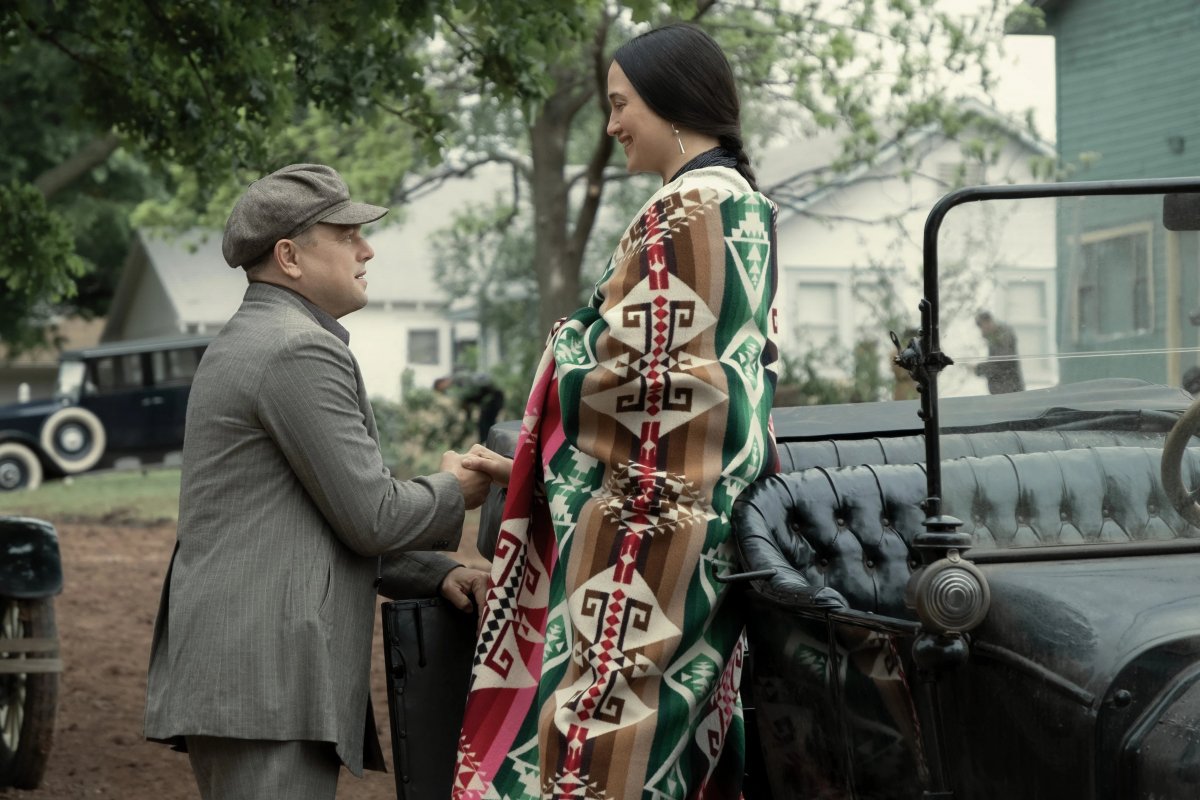This is what would be lost with all the banned books talk. Killers of the Flower Moon highlights an important piece of United States History. It also is a very unflattering portrayal of how 1920s Caucasian Americans attempted to whitewash US History through Native American blood. Enter Martin Scorcese, who plows into that conversation head on with a streaming version of the book, guaranteeing two things: 1) everyone will hear this story and 2) any attempts to ban this book will be met with more extreme hostility. I know it’s too little too late for the Osage Nation, but it’s a start at least.
In 1890’s America, the Osage Nation successfully negotiated with the US government to have rights to their land. Just in time: the land struck oil, making this tribe some of the richest people in the country. Tribal heirs like Mollie Kyle (Lily Gladstone) and her sisters Minnie (Jillian Dion) and Anna (Cara Jade Myers) became the inheritors of this land due to their birthright. Around the 1920s, Ernest Burkhart (Leonardo DiCaprio) returns home a war hero from WWI, and settles in with his uncle William Hale (Robert De Niro). Hale points Ernest’s eyes towards Mollie, in hopes the Burkhart’s can marry into this wealth. And if they can’t do that, find a way to steal it.
This story couldn’t be more built for Martin Scorcese. Let’s start with period piece and location. The director also gives us a specific layout of 1920’s Oklahoma. The Osage is a place that seems really big and really small at the same time: giant oil derricks, boxcar races, but a small community where everyone knows everyone, especially if you’re powerful enough. And like a Marty movie, then the murders begin. The first hour of this movie is chilling to behold, as we see a bunch of faceless white men murdering Native Americans in more evil and brazen ways. From his 1970s roots, we then get that efficient stakes laying, where we see the day to day life of Mollie and her family, and Ernest and his. While Ernest merely has to think of an idea and it comes true, everything comes with caveats for Mollie and the Osage. They can’t even take out money from their estates without having some white middle man deciding if it’s a “good” idea for them to do. And then the story starts ebbing and flowing like a Scorcese movie river, as we see the more intricate plotting towards specific murders of characters we’ve gotten to know a little, as well as the pervasive institutional permission every white person has to pull this off without consequences. And finally, like a Scorcese movie, the consequences eventually come in the form of Tom White (Jesse Plemons) and J. Edgar Hoover’s Department of Investigation (FBI precursor the DOI) as we embark on a shift in Killers’s story to it’s final resting place. And in Martin Scorcese, Killers of the Flower Moon is about the surest Captain of a ship you could have for this epic journey.
Which is why only the director can only work with the best actors working today. Surprisingly, Leo DiCaprio isn’t the big acting performance here. He’s playing Ernest as the story needs: kind of a bumbling idiot insisting punching outside his weight class. It’s not showy, but it’s solid and stable. Robert De Niro is the star of this one. His Hale and those perfectly circular spectacles shoot lasers into your soul, chilling you to the bone with his calculated, cruel belief in his “birthright” at the expense of an entire race of Native Americans he supposedly “loves.” As for the rest of the cast, it’s filled with mostly newcomers who really rise to the occasion. Lily Gladstone gives the movie a wonderful Osage character to believe in. Her Mollie is constantly listening first, talking second, and trying to make the smart move as often as she can. We feel all her highs and especially lows as poor Mollie is pulled in a million awful directions as she loses family member after family member. I also adored William Belleau playing Mollie’s cousin Henry Roan, and Cara Jade Myers as the carpe dieming Anna. Brendan Fraser, John Lithgow, and Ty Mitchell are also good in small roles.
Maybe the better title for Killers of the Flower Moon is An American Tragedy. As propulsive as Martin Scorcese makes this film, it’s clear from the get go this is an unbearably sad story. And through little tie ins to the Tulsa Race Massacre at the time, our brilliant Marty is painting a picture of America others will be trying to get rid of in the name of the “children.” Whose children though, book banners? Whose children are we trying to save here?

